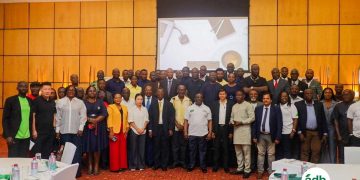- Gold, Power, and Broken Promises: The Untold Truth Behind Ghana’s $300M Mine Dispute
In what could be one of Ghana’s most consequential mining sagas in recent memory, a complex battle over control of the Black Volta Gold Project is testing the boundaries of investor trust, contract enforcement, and national resource ownership. The players include a Ghanaian powerhouse, Engineers & Planners (E&P), and an international consortium led by Azumah Resources, headquartered in Australia.
At stake: a mine now valued at over $300 million and Ghana’s aspiration to foster indigenous ownership in large-scale mining.
It began as a promising story of transformation. Azumah Resources, after sitting on the Black Volta concession for over a decade without development, sought a local partner to revive the site on their own with Azumah’s intention to sell its 100% stake and leave, all because the gold price took a nose dive and there was no end in sight for it to recover anytime soon.
NorvanReports investigations have revealed that around this time, Azumah was indebted to Ghanaian regulatory bodies, including the Minerals Commission, and owed over $3 million to the Ghana Revenue Authority (GRA) alone. Azumah’s shareholders were ready to exit. They then, at their own free will, contacted E&P and offered them the first right to buy the mine site. E&P, riding high from its work at the nearby Cardinal mine, stepped in with a bold vision to raise $100 million to pay off Azumah over two years as agreed and bring the mine into Ghanaian hands.
DELAYED COMMITMENTS AND RESET TIMELINES
But a closer look at internal communications obtained by NorvanReports reveals that the partnership stumbled from the outset, not due to E&P’s failure, but due to Azumah’s delay in executing the final agreement. The original plan was for the agreement to be signed by August 2023, to pave the way for E&P to arrange financing. Instead, according to information gathered by NorvanReports and internal emails, the fully signed document wasn’t returned to E&P until late November of that year.
Indeed, in a July 23, 2024 email, James Wallbank of Ibaera Capital, acting on behalf of the Azumah consortium, wrote, “We have extended the date for the EPC agreement and equity financing to 30th July. We have extended the date for financing to 30th August, and the date for Payment 1 milestone to 31 December 2024.”
DEBT, DELAYS, AND DUE DILIGENCE
Amid these adjustments, NorvanReports has learnt that E&P assumed operational control and began financing the mine, pumping in around $500,000 monthly, if not more. They also renegotiated Azumah’s GRA liabilities, securing waivers and repayment terms that staved off the foreclosure of the mine by the tax authority. Documents confirm E&P even paid staff salaries at Azumah as recently as June 2025, long after Azumah claimed the agreement was terminated in December 2024.
So what changed? A million-dollar question NorvanReports has been asking, and many have suggested that the answer is gold prices. With Black Volta owners now claiming that the value of the mine is put at $300 million, the Australian shareholders allegedly moved the goalposts, demanding a new valuation and refusing to honour the initial terms. “They said if we don’t pay them $300 million, we can forget it,” one staff member closer to the transaction said. “Yet they were taking money from us every month even after their so-called termination.”
THE LEGAL TURN
Faced with unilateral board actions, including attempts to dissolve the project’s finance committee and sideline E&P from decision-making, the Ghanaian firm sought relief in court. In June 2025, the High Court of Ghana granted an interim injunction, ruling that the agreement remains binding until arbitration concludes.
The injunction barred Azumah and its partners from selling the asset, raising new funding, or appointing new leadership without E&P’s consent. The ruling also acknowledged that E&P had invested significantly in the venture and that allowing Azumah to act unilaterally could cause irreparable harm.
DISCLAIMERS, PR AND THE REAL DEAL
Just days before E&P’s scheduled signing of a financing agreement with EBID, the Ecowas Bank for Investment and Development, Azumah issued a public disclaimer disavowing the deal. Yet court records, internal emails, and payment receipts show that the relationship was active well into mid-2025.
“Do you think EBID, after hiring a French firm to conduct due diligence, would approve the facility if E&P had no legal stake?” This was the rhetorical question posed by a representative to NorvanReports.
A DEFINING MOMENT FOR GHANA’S MINING FUTURE
As International Chamber of Commerce arbitration proceedings advance, the case promises to establish important precedents for mining partnerships across West Africa. The questions it raises, about contract sanctity, operational financing obligations, and commodity price windfalls, extend far beyond the specific parties involved.
For Ghana’s mining sector, the outcome could influence how future partnerships between local and international firms are structured, particularly regarding financing obligations and governance arrangements during commodity price volatility.
The immediate stakes remain substantial. E&P claims to have invested over $4 million in keeping the operations viable, while the underlying mining assets could be worth hundreds of millions at current gold prices. Today’s Monday, July 7, 2025 planned EBID signing ceremony, which is proceeding, would mark a significant milestone in African mining development.
The Black Volta dispute illuminates broader tensions reshaping African mining finance. As commodity prices reach historic highs, the traditional model of international ownership and local operational support faces new pressures. Local firms increasingly possess both technical capabilities and financing access, challenging established hierarchies.









x